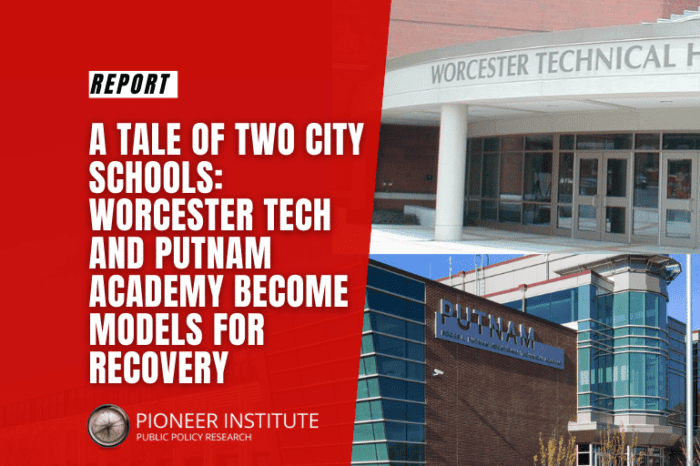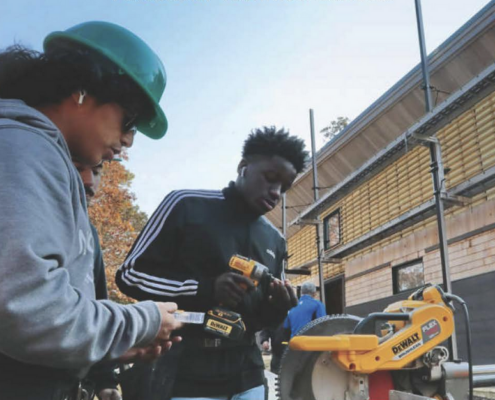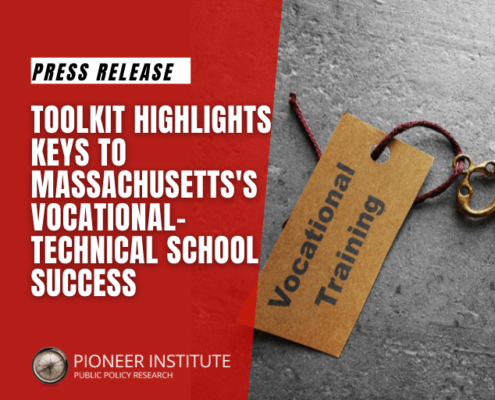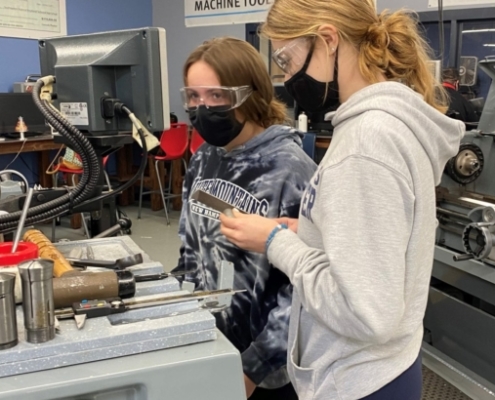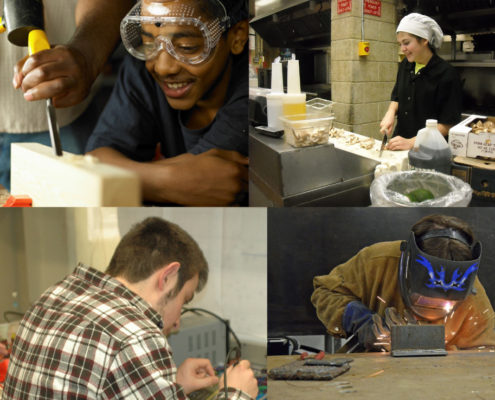Two Stars in a Glowing Voc-Tech Education System
Worcester Technical and Putnam Academy, once distressed urban high schools, prove turnarounds can happen
BOSTON (September 20) — Since the early 1990s, Massachusetts has been a national leader in vocational-technical high school education. During the past 15 years, that reputation has been burnished by the remarkable turnaround at two schools in particular: Worcester Technical High School and the Roger L. Putnam Vocational Technical Academy in Springfield.
Once known for high dropout rates and low graduation rates, these schools now excel due to new leadership, community investment, and committed teachers. In the process, these schools have produced students who join the local labor force with employable skills and high academic achievement.
The two schools are the focus of “A Tale of Two City Schools: Worcester Tech and Putnam Academy Become Models for Recovery,” a new white paper by Pioneer Institute. The report analyzes how Worcester Tech and Putnam Academy — schools with high numbers of low-income and special needs students — leapt from the bottom of Massachusetts voc-tech rankings to become leaders among local schools.
In the early 2000s, both schools operated in aging buildings with poor shop labs and low student and teacher morale. Academic improvement was not stressed, and MCAS scores were unimpressive.
By 2010, each school moved into a state-of-the-art facility and had placed new emphasis on academics — adding Advanced Placement (AP) courses and measures to improve MCAS scores.
New administrations managed the schools’ makeovers. Worcester Tech’s revival was led by Sheila Harrity, a principal who brought passion for vocational-technical education and a determination to increase academic rigor. Putnam Academy was led by Gilbert Traverso. His deep review of each vocational department uncovered accounting problems and other issues in several shops.
The Pioneer paper includes interviews with administrators and presents several recommendations that could help transform struggling voc-tech schools.
Recommendations include:
Recruit a business leader to spearhead fundraising
Voc-tech schools need close ties with local business communities in order to thrive. A dynamic business leader is invaluable for raising money and organizing equipment donations.
Don’t expect principals to know everything
Worcester Tech’s Harrity was named National High School Principal of the Year. However, she encouraged local principals to recruit administrators, teachers, and tradespeople who could assist them.
Highlight the importance of academics to vocational skills
Both Harrity and Traverso believe schools should place a dual emphasis on academics and vocational skills. Traverso recalls how paying closer attention to algebra lessons in high school helped him years later as an electrical contractor.
Establish a dedicated fund
Worcester Tech and Putnam Academy are public schools that operate under their designated school system. To afford a major transformation, 501(c)(3) nonprofits were formed. In Worcester, the Skyline Technical Fund helped finance the purchase of computers and related equipment. Putnam Academy is associated with the Putnam Technical Fund, which supports “current and future training courses” at the school.
Worcester Tech and Putnam Academy drew regional and national recognition for their transformations. Worcester Tech received a coveted Blue Ribbon Award from the federal Department of Education and a visit from President Barack Obama. The president gave the school’s commencement address in 2014, saying he wanted the nation “to learn from Worcester Tech.” Putnam Academy received its own accolades, with the New England Association of Schools and Colleges citing the school’s reorganization and commitment to fiscal integrity.
“Over the years, Worcester Tech and Putnam Academy have taught high-value skills alongside traditional academics, empowering local students to find their passions,” said Jamie Gass, Director of the Center for School Reform at Pioneer Institute. “Hopefully, voc-tech schools throughout the state can learn from their successes and implement systems that work for their individual students.”
###For more information or to schedule interviews with the author of the report, please contact Lizzie Nealon at (202) 996-0051 or lizzie@keybridge.biz.
About Pioneer Institute
Pioneer Institute is a think tank dedicated to developing ideas that advance prosperity and a vibrant civic life in Massachusetts and beyond. The organization produces research almost exclusively through outside experts to ensure credibility, and acts as a resource for legislators on Beacon Hill and for staff in the State’s executive offices.
Help us expand voc-tech education
Related Posts:

